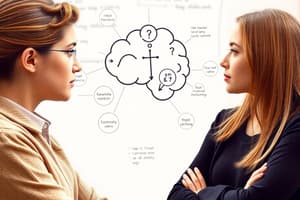Podcast
Questions and Answers
What is necessary for learners to exert effort in acquiring complex knowledge and skills?
What is necessary for learners to exert effort in acquiring complex knowledge and skills?
- A structured learning environment
- Access to resources
- Extrinsic rewards
- High motivational levels (correct)
How does taking individual differences into account affect learning?
How does taking individual differences into account affect learning?
- Decreases the overall effectiveness
- Makes learning standard across all students
- Increases the need for standardized assessments
- Enhances the learning experience (correct)
Which domain of development includes knowledge and reasoning skills?
Which domain of development includes knowledge and reasoning skills?
- Affective domain
- Cognitive domain (correct)
- Psychomotor domain
- Emotional domain
Which statement about the lifespan perspective is true?
Which statement about the lifespan perspective is true?
What aspect of learning does social interaction influence significantly?
What aspect of learning does social interaction influence significantly?
Which principle suggests that characteristics can change throughout an individual's life?
Which principle suggests that characteristics can change throughout an individual's life?
According to Havighurst's developmental tasks, which age range corresponds to middle childhood?
According to Havighurst's developmental tasks, which age range corresponds to middle childhood?
Which of the following best describes the concept of 'development is multidimensional'?
Which of the following best describes the concept of 'development is multidimensional'?
What is the main focus of the learner-centered principle (LCP)?
What is the main focus of the learner-centered principle (LCP)?
Which of the following describes successful learners?
Which of the following describes successful learners?
What does the 'construction of knowledge' principle entail?
What does the 'construction of knowledge' principle entail?
Which factor is NOT part of the cognitive and metacognitive principles of learning?
Which factor is NOT part of the cognitive and metacognitive principles of learning?
How does intrinsic motivation affect the learning process?
How does intrinsic motivation affect the learning process?
What role do environmental factors play in the context of learning?
What role do environmental factors play in the context of learning?
What type of thinking strategies do successful learners utilize?
What type of thinking strategies do successful learners utilize?
Which statement best reflects the goals of the learning process?
Which statement best reflects the goals of the learning process?
What does lifelong development encompass?
What does lifelong development encompass?
Which of the following describes Baltes' concept of multidimensionality in development?
Which of the following describes Baltes' concept of multidimensionality in development?
What does the concept of selective optimization with compensation imply?
What does the concept of selective optimization with compensation imply?
What aspect of development does plasticity refer to?
What aspect of development does plasticity refer to?
Which of the following is an example of a normative age-graded influence on development?
Which of the following is an example of a normative age-graded influence on development?
What are normative history-graded influences?
What are normative history-graded influences?
How is cognitive function in mature adults related to brain plasticity?
How is cognitive function in mature adults related to brain plasticity?
Which of the following statements about development is incorrect?
Which of the following statements about development is incorrect?
What characterizes nonnormative influences in development?
What characterizes nonnormative influences in development?
Which of the following is NOT a part of Sigmund Freud's model of personality?
Which of the following is NOT a part of Sigmund Freud's model of personality?
In Piaget's theory, during which stage do children develop the ability to think rationally about abstract concepts?
In Piaget's theory, during which stage do children develop the ability to think rationally about abstract concepts?
What is the goal of psychoanalytic therapy as proposed by Freud?
What is the goal of psychoanalytic therapy as proposed by Freud?
What primarily distinguishes the pre-operational stage of cognitive development?
What primarily distinguishes the pre-operational stage of cognitive development?
Which influence is NOT included in the biospychosocial model?
Which influence is NOT included in the biospychosocial model?
What is the primary focus of Piaget's theory of cognitive development?
What is the primary focus of Piaget's theory of cognitive development?
What kind of learning does the concept of 'self-activity' refer to?
What kind of learning does the concept of 'self-activity' refer to?
Flashcards are hidden until you start studying
Study Notes
Learners and Teachers
- Learners are the center of instructional processes and educational endeavors.
- Instruction revolves around the active engagement and needs of learners.
- Teachers play a pivotal role in facilitating teaching and learning.
Learner-Centered Principle (LCP)
- Developed by the American Psychological Association (Alexander and Murphy).
- Focuses on the learning process and psychological factors affecting learners.
- Aims to enhance understanding and efficacy of education.
Successful Learners Characteristics
- Active participation in their education.
- Goal-oriented with clear objectives.
- Self-regulation to manage their learning processes.
14 Principles of Learning
- Comprised of cognitive, metacognitive, motivational, affective, individual differences, developmental, and social factors.
Cognitive and Metacognitive Factors
- Nature of Learning Process: Learning is most effective when intentionally constructing meaning from information.
- Goal of Learning Process: Successful learners create coherent knowledge representations over time with guidance.
- Construction of Knowledge: Linking new information to existing knowledge enhances understanding.
- Strategic Thinking: Successful learners utilize diverse thinking strategies to solve complex problems.
- Thinking About Thinking: Higher-order strategies facilitate creative and critical thinking.
- Context of Learning: Environmental factors like culture and technology significantly influence learning outcomes.
Motivational and Affective Factors
- Motivation Influences Learning: Both the quantity and quality of learning are affected by learners' motivation linked to their emotional states and beliefs.
- Intrinsic Motivation: Creativity and curiosity enhance motivation when tasks are relevant and allow personal choice.
- Effects of Motivation on Effort: Acquiring complex skills necessitates substantial effort; lack of motivation may hinder this.
Individual Differences Factors
- Diversity in Learning: Different learners exhibit varying strategies and capabilities influenced by prior experiences and genetics.
- Learning and Diversity: Recognizing individual differences enhances learning efficacy.
- Standards and Assessment: Setting high standards and assessing progress are vital parts of the educational process.
Developmental and Social Factors
- Developmental Influences: Learning is optimized when physical, intellectual, emotional, and social developmental differences are acknowledged.
- Social Influences: Interpersonal relations and communication significantly affect learning.
Domains of Development
- Physical Domain: Focuses on growth, motor skills, and general health.
- Cognitive Domain: Involves learning, memory, reasoning, and creativity.
- Psychosocial Domain: Relates to emotions, personality, and social relationships.
Developmental Tasks (Robert Havighurst)
- Identified stages of developmental tasks across different life phases: infancy, early childhood, middle childhood, and adolescence.
Lifespan Perspective (Paul Baltes)
- Development spans the entire life and is influenced by biological, cognitive, and psychosocial changes.
- Key principles: lifelong development, multidimensionality, multidirectionality, plasticity, contextual influences, and multidisciplinary approaches.
Sigmund Freud's Theories
- Emphasized the significance of the conscious and unconscious mind on behavior.
- Psychoanalytic goals include bringing the unconscious to consciousness.
Jean Piaget's Contributions
- Pioneer in developmental psychology and cognitive development theories.
- Proposed that learning is rooted in experiential interaction.
Structure of Personality (Freud)
- ID: Operates on the pleasure principle, fulfilling basic needs and instincts.
- EGO: Functions based on the reality principle, balancing desires with rational thought.
- SUPER EGO: Represents moral standards and conscience, operating unconsciously and consciously.
Levels of Consciousness
- Unconscious: Outside awareness but influences behavior.
- Preconscious: Information that is not actively thought about but can be recalled.
- Conscious: Current awareness and active thought processes.
Piaget’s Stages of Cognitive Development
- Sensori-Motor Stage (0-2 years): Learning through sensory experiences and movement.
- Pre-Operational Stage (2-7 years): Thinking is symbolic and intuitive.
- Concrete Operational Stage (7-11 years): Development of logical and concrete operations.
- Formal Operational Stage (12+ years): Ability to think abstractly and consider hypothetical scenarios.
Studying That Suits You
Use AI to generate personalized quizzes and flashcards to suit your learning preferences.




